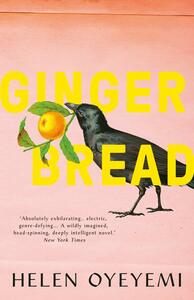Take a photo of a barcode or cover
I tried so hard to like this book because Helen Oyeyemi’s writing is magic, but I just couldn’t get into it. It was a slog, and I spent most of the book wishing I was done reading it. Bummer.
Just as I thought I understood where this book was going, I suddenly did not. A second reading would help me figure out if the fault is mine or the book's, but I don't think it was quite engrossing enough for me to try it again.
Stunning magical realism. Fantastic storytelling in every sense. Love love love.
Helen Oyemi’s books are difficult to read because there is so much depth and allegory and weird magic. For me to enjoy them, I have to stop trying to understand them. Kind of like those old weird magic 3D images where you have to lose focus to see the picture. Gingerbread is a story of family love and dysfunction and magic. Four stars. But if you’re new to Oyemi’s works, start with another one of her books, maybe Boy, Snow, Bird.
hopeful
mysterious
slow-paced
Plot or Character Driven:
Character
Strong character development:
Complicated
Loveable characters:
Complicated
Diverse cast of characters:
Yes
Flaws of characters a main focus:
Complicated
Reading this book is kind of like being in a fever dream. It drifts along, with stories of the past being told in the future, with a sense of unhurridness, never in a rush to get anywhere and with no set destination anyway.
The presence of fairytale ginger bread in the current world is one that remains intriguing even after the end of the novel.The exploitation of the gingerbread and the children linked to it is quite shocking to read, and yet seems forgotten by the novel’s conclusion. Is is there to highlight the shocking misuse of workers, children and wealth? Was the gingerbread as magical as it seems or was it the advertising that made it so? It’s a stark comment on consumerism if nothing else. But whilst the gingerbread is frequently cooked and eaten throughout the story, it didn’t have the role I wanted it to. Harriet was the harbinger of the gingerbread consistently and it felt that perhaps the gingerbread was only meaningful because of her presence rather than any reason of its own.
Love and relationships are explored very non-conventionally, and it’s hard to tell if any of the romantic relationships ever actually feel what we would deem to be love. The Kerchevals especially are very transactional in their relationships and neither blood nor marriage binds them tightly.
Gretal is an intriguing character. Aloof and entitled and yet Harriet’s friendto the extent of rescuing her from the gingerbread girls. Her admission of being a changling is unsurprising as she always seemed other worldly, but the final chapter being narrated by her as she observes Harriet’s life seems to be very out of touch with the rest of the novel. . With friendship a key element of the novel, her place within it is made more central than it perhaps deserves to be.
The rambling narrative of the novel will not be to everyone’s taste. This is a book without a purposeful destination. Rather, enjoy the language, the images and the journey.
The presence of fairytale ginger bread in the current world is one that remains intriguing even after the end of the novel.
Love and relationships are explored very non-conventionally, and it’s hard to tell if any of the romantic relationships ever actually feel what we would deem to be love. The Kerchevals especially are very transactional in their relationships and neither blood nor marriage binds them tightly.
Gretal is an intriguing character. Aloof and entitled and yet Harriet’s friend
The rambling narrative of the novel will not be to everyone’s taste. This is a book without a purposeful destination. Rather, enjoy the language, the images and the journey.
Moderate: Suicide, Suicide attempt
adventurous
emotional
hopeful
mysterious
reflective
medium-paced
Plot or Character Driven:
Character
Strong character development:
Yes
Loveable characters:
Yes
Diverse cast of characters:
Yes
Flaws of characters a main focus:
Complicated
This was one of the last novels I read this year and I adored it. A woman is forced to confront her past when her daughter almost dies. She has to grapple with her childhood in a country that for all intents and purposes does not exist and her relationships to her mother and the family responsible for her leaving the country of her birth.
I was immediately drawn in by the dreamy prose that gives the world, especially the non-existent country but also the present in England, a fairytale feel, with all the whimsy and uncanniness that implies. Harriet and her struggles, anxieties, hopes and dreams, felt solid and real to me and I loved exploring what made her who she is in themes of belonging, legacy and origin.
I was immediately drawn in by the dreamy prose that gives the world, especially the non-existent country but also the present in England, a fairytale feel, with all the whimsy and uncanniness that implies. Harriet and her struggles, anxieties, hopes and dreams, felt solid and real to me and I loved exploring what made her who she is in themes of belonging, legacy and origin.
Off the bat, I want to say that I really enjoy the surreal, quirky and often times funny tone of Oyeyemi's writing. This book feels like an Afro-British take on Welcome to Night Vale: the strange nation of Druhástrana that appears on no maps, the mischievous (murderous?) Gretel who can change form and never age, the judge-y talking dolls. I dig this universe and the surreal happenings that make up life in it.
However, the story itself left me wanting. The meat of it takes place after Perdita, a teenage girl with Celiac disease, eats a near fatal dose of her mother's special gingerbread. While on the mend, she asks her mother, Harriet, about her childhood in her unheard-of-nation and what it has to do with the numerous batches of gingerbread she bakes up. You see, Harriet makes A LOT of the stuff, giving it away to friends, family and her unsuspecting members of her PTA.
Harriet's story is where things begin lag. We listen as she describes leaving the family home for a job as what can only be described as "a geisha but with just a bunch of gingerbread." It's here she becomes closer to Gretel and learns more of the world outside of Druhástrana. She soon moves in with a family — known as the Kerchevals — and gets entangled with their complex paternal/fraternal/spousal drama.
Life with the Kerchevals is the book's low point for me and where I was tempted to quit. There are so many different members of the family and Oyeyemi overloads us with ultimately unnecessary details about each of them. The Kerchevals are important to the ending and overall theme of the book, but we don't need to be told as much about them as we are.
The ending is sweet and would be more satisfying if I weren't so tired of reading about all the Kerchevals' issues in the previous chapters. The themes of family and friendship are especially strong in the ending, so me being me loved it. Had that middle section of the book been a bit tighter, this would easily be a four- or five-star read.
If you've enjoyed her previous work, you'll probably enjoy this one, too. At this point, I don't know if can I recommend this for those who are new to her work; I'm new to it myself. I'm definitely going to check out more, though, because I enjoy really did love her style.
However, the story itself left me wanting. The meat of it takes place after Perdita, a teenage girl with Celiac disease, eats a near fatal dose of her mother's special gingerbread. While on the mend, she asks her mother, Harriet, about her childhood in her unheard-of-nation and what it has to do with the numerous batches of gingerbread she bakes up. You see, Harriet makes A LOT of the stuff, giving it away to friends, family and her unsuspecting members of her PTA.
Harriet's story is where things begin lag. We listen as she describes leaving the family home for a job as what can only be described as "a geisha but with just a bunch of gingerbread." It's here she becomes closer to Gretel and learns more of the world outside of Druhástrana. She soon moves in with a family — known as the Kerchevals — and gets entangled with their complex paternal/fraternal/spousal drama.
Life with the Kerchevals is the book's low point for me and where I was tempted to quit. There are so many different members of the family and Oyeyemi overloads us with ultimately unnecessary details about each of them. The Kerchevals are important to the ending and overall theme of the book, but we don't need to be told as much about them as we are.
The ending is sweet and would be more satisfying if I weren't so tired of reading about all the Kerchevals' issues in the previous chapters.
Spoiler
Harriet ultimately leaves the family's home — both by choice and necessity — after announcing her unplanned pregnancy. We learn Perdita, desperate to know more about where she came from, contacted a private investigator who was also secretly her uncle. Drawn to the man and his paternal attentions, she later meets with him and the rest of the Kerchevals and is eventually given the ingredients to make the gingerbread that nearly kills her. Everyone gets over this possible crime SOMEHOW and comes together as a family to try and buy a house that eventually runs away. Yes, the house runs away. I still don't know what to do with that plot point lol.If you've enjoyed her previous work, you'll probably enjoy this one, too. At this point, I don't know if can I recommend this for those who are new to her work; I'm new to it myself. I'm definitely going to check out more, though, because I enjoy really did love her style.
I so thoroughly enjoyed this magical realism world, stitched into a timespan not entirely unlike our own. I told Greg that one of the reasons I so love magical realism is the central force is interpersonal relations, couched within a world in which grassy dolls can talk and astral projecting is a very near possibility. Childhood, motherhood, and found-families are at the heart of Oyeyemi’s latest work. Themes made even richer by the back catalogue of secret origin stories and tales from the unmapped homelands, and the uncertainty of who our protagonist should be. Chief amongst the beloved factors of this book are the mythic, titular gingerbread, which may or may not have been a Rosebudesque red herring all along. Recommended for fans of Oyeyemi’s previous work, and all those interested in dipping their toes in the generational, family-driven realm of magical realism.
I found this book to be brilliant but a little hard to follow






